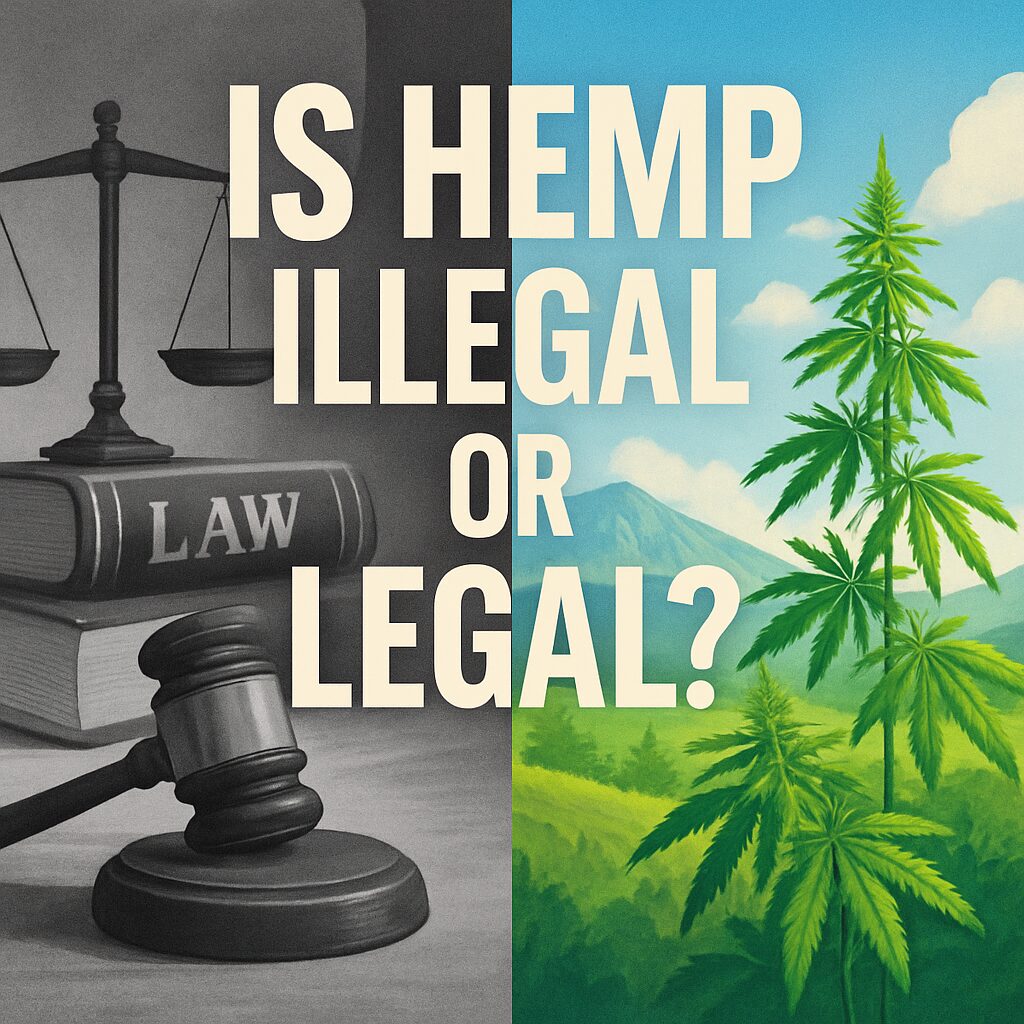Blog
Why is Hemp Illegal or legal? Understanding the Future of Hemp Legislation

Is Hemp Illegal or legal? Understanding the History, Politics, and Future of Hemp Legislation
Hemp is one of the oldest cultivated plants known to humanity, used for thousands of years in textiles, medicine, construction, and more. Despite its sustainable potential, hemp was criminalized in many countries for decades. Why? What led to its prohibition? In this comprehensive article, we dive into the reasons behind hemp’s illegality, its differences from marijuana, the socio-political factors at play, and the future of hemp legalization around the world.
Table of Contents
- What is Hemp?
- The Difference Between Hemp and Marijuana
- The History of Hemp Prohibition
- Political and Industrial Influences
- Modern-Day Legalization Movements
- Why Hemp Should Be Legal
- References and Research
What is Hemp?
Hemp is a variety of the Cannabis sativa plant species that is grown specifically for industrial use. It contains less than 0.3% THC (tetrahydrocannabinol), the psychoactive compound responsible for the “high” in marijuana. Hemp can be used to make over 25,000 products including rope, fabric, paper, biofuel, building materials, and even food supplements like hemp seeds and CBD oil.
The Difference Between Hemp and Marijuana
Although hemp and marijuana come from the same species, they are vastly different in usage and chemical composition.
- THC Content: Hemp has 0.3% or less THC, while marijuana can have 5–30% THC.
- Usage: Hemp is industrial and nutritional; marijuana is psychoactive and medicinal.
- Appearance: Hemp grows taller and skinnier, marijuana is bushier with dense buds.
The History of Hemp Prohibition
Hemp cultivation dates back over 10,000 years, with early uses in China, India, and Mesopotamia. It was only in the 20th century that hemp became entangled in global drug laws.
The U.S. Marihuana Tax Act of 1937
This act, lobbied by industrialists like William Randolph Hearst and petrochemical magnates, lumped hemp in with marijuana, effectively banning both. Paper, nylon, and fossil fuel interests saw hemp as a competitive threat.
War on Drugs (1970s)
The Controlled Substances Act classified all cannabis as Schedule I drugs—making no distinction between industrial hemp and psychoactive marijuana. This impacted legislation across the world, including in India, despite the cultural and Ayurvedic use of cannabis and hemp.
Political and Industrial Influences
Major players in oil, timber, and pharmaceutical industries supported hemp prohibition to avoid competition.
- DuPont: Introduced nylon as a competitor to hemp fiber.
- Hearst Newspapers: Published anti-cannabis propaganda.
- Petrochemical Lobby: Suppressed hemp-based biofuel.
Modern-Day Legalization Movements
In recent decades, countries have begun revisiting hemp laws:
- USA: The 2018 Farm Bill legalized hemp federally.
- India: Uttarakhand became the first Indian state to legalize hemp cultivation in 2018.
- Europe: Many EU countries permit hemp cultivation under strict THC limits.
Organizations like the Indian Hempstore are pushing for policy, supply chain, and industrial innovation in this space.
Why Hemp Should Be Legal
Legalizing hemp has numerous benefits:
- Sustainability: Hemp requires less water and pesticides than cotton or other crops.
- Economic Growth: Potential to generate a $1B+ hemp economy in India.
- Health & Nutrition: Hemp seeds are rich in omega-3, protein, and fiber.
- Medical Uses: CBD extracted from hemp helps in treating epilepsy, anxiety, and inflammation.
By separating hemp from marijuana in public policy, India can revive an ancient crop with futuristic promise.
References and Research
- Li, Hui-Lin. “The Origin and Use of Cannabis in Eastern Asia.” Economic Botany, 1974.
- Brookings Institution: The Farm Bill Legalizes Hemp
- CBD and Epilepsy: NCBI Research Article
- Hemp: A Sustainable Plant – Environmental Research
Conclusion
Hemp has suffered from decades of misunderstanding, misinformation, and industrial sabotage. As we uncover its rich history and boundless future potential, the question isn’t “Why was hemp illegal?”—it’s “Why did we wait this long to bring it back?” Legalizing hemp isn’t just about policy; it’s about creating a future that’s sustainable, profitable, and rooted in tradition.
Interested in becoming a part of India’s hemp revolution?
Explore Indian Hempstore—India’s first hybrid hemp marketplace for B2B and B2C. Let’s build a $1B hemp industry together.




